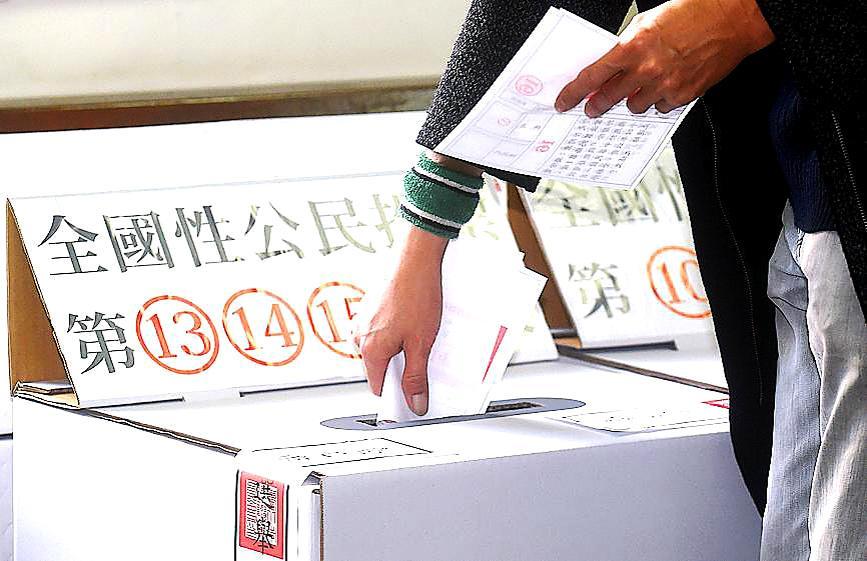Academics today expressed concern that combining referendums with elections would result in more risks than benefits, as experts and officials gathered to discuss proposed changes to referendum law.
Chinese Nationalist Party (KMT) Legislator Lo Chih-chiang’s (羅智強) draft amendment would require that referendums be held between one and six months of being announced, and held on the same day as a national election if the dates coincide.
The Legislative Yuan’s Internal Administration Committee decided that there would be two public hearings to debate the amendments, the second of which was today, led by KMT Legislator Hsu Hsin-ying (徐欣瑩).

Photo: Liao Chen-huei, Taipei Times
In the hearing, experts said that referendums are often more about politics than genuine public desire.
However, the proposal could be feasible if the referendum’s deliberation and announcement periods are stretched out to longer than six months, they said.
Voting can be a bigger burden when asking citizens to vote on both issues and candidates simultaneously, which could lead to less rational decisionmaking, said Wang Yi-fan (王禕梵), a professor of political science at National Cheng Kung University.
The decision to combine referendums with elections is one of choice, rather than binary right and wrong, National Chengchi University law professor Lin Chia-ho (林佳和) said.
A successful referendum system is one that has sufficient time for full deliberation and ensures that all voters are aware of the issues they are voting on, Lin added.
Referendums are often political tools rather than reflections of public will, and under current conditions, the proposal would do more harm than good, he said.
If the deliberation period is extended longer than six months, it would help focus the public and make the proposal viable, he added.
Under the Referendum Act (公民投票法), officials review proposals within 60 days of receipt and announce referendum dates at last 90 days in advance.
Current regulations limit referendums to once every two years, but under the new proposal, they could happen twice in 12 months, which could overburden the public or increase voter fatigue, said Chen Chi-hua (陳志華), a professor of politics at National Taipei University.
The chaos during the 2018 local elections, which were combined with referendums, was due to technical issues, not systemic flaws, Kainan University law professor Chang Kuei-mei (仉桂美) said.
Chang, who at the time was a member of the Control Yuan and criticized the Central Election Committee (CEC), said that the Democratic Progressive Party failed to address the administrative and technological issues, which has deprived voters of their rights.
Rational deliberation is essential for referendums, CEC Deputy Chairman Chen Chao-chien (陳朝建) said.
Separating referendums and elections gives officials enough time to prepare, and helps voters focus on issues separately from candidates, which contributes to democratic consolidation and stability, Chen said.
Regarding suggestions around electronic voting, Chen said that Taiwan’s enemies would want the nation to implement it as a way of undermining democracy, adding that society’s trust is a priority.

Taiwan has received more than US$70 million in royalties as of the end of last year from developing the F-16V jet as countries worldwide purchase or upgrade to this popular model, government and military officials said on Saturday. Taiwan funded the development of the F-16V jet and ended up the sole investor as other countries withdrew from the program. Now the F-16V is increasingly popular and countries must pay Taiwan a percentage in royalties when they purchase new F-16V aircraft or upgrade older F-16 models. The next five years are expected to be the peak for these royalties, with Taiwan potentially earning

STAY IN YOUR LANE: As the US and Israel attack Iran, the ministry has warned China not to overstep by including Taiwanese citizens in its evacuation orders The Ministry of Foreign Affairs (MOFA) yesterday rebuked a statement by China’s embassy in Israel that it would evacuate Taiwanese holders of Chinese travel documents from Israel amid the latter’s escalating conflict with Iran. Tensions have risen across the Middle East in the wake of US and Israeli airstrikes on Iran beginning Saturday. China subsequently issued an evacuation notice for its citizens. In a news release, the Chinese embassy in Israel said holders of “Taiwan compatriot permits (台胞證)” issued to Taiwanese nationals by Chinese authorities for travel to China — could register for evacuation to Egypt. In Taipei, the ministry yesterday said Taiwan

‘LIKE-MINDED PARTNER’: Tako van Popta said it would be inappropriate to delay signing the deal with Taiwan because of China, adding he would promote the issue Canadian senators have stressed Taiwan’s importance for international trade and expressed enthusiasm for ensuring the Taiwan-Canada trade cooperation framework agreement is implemented this year. Representative to Canada Harry Tseng (曾厚仁) in an interview with the Central News Agency (CNA) said he was increasingly uneasy about Ottawa’s delays in signing the agreement, especially as Ottawa has warmed toward Beijing. There are “no negotiations left. Not only [is it] initialed, we have three versions of the text ready: English, French and Mandarin,” Tseng said. “That tells you how close we are to the final signature.” Tseng said that he hoped Canadian Prime Minister Mark Carney

POSITIVE DEVELOPMENT: Japan and the US are expected to hold in-depth discussions on Taiwan-related issues during the meeting next month, Japanese sources said The holding of a Japan-US leaders’ meeting ahead of US President Donald Trump’s visit to China is positive news for Taiwan, former Japan-Taiwan Exchange Association representative Hiroyasu Izumi said yesterday. After the Liberal Democratic Party’s landslide victory in Japan’s House of Representatives election, Japanese Prime Minister Sanae Takaichi is scheduled to visit the US next month, where she is to meet with Trump ahead of the US president’s planned visit to China from March 31 to April 2 for a meeting with Chinese President Xi Jinping (習近平). Japan and the US are expected to hold in-depth discussions on Taiwan-related issues during the